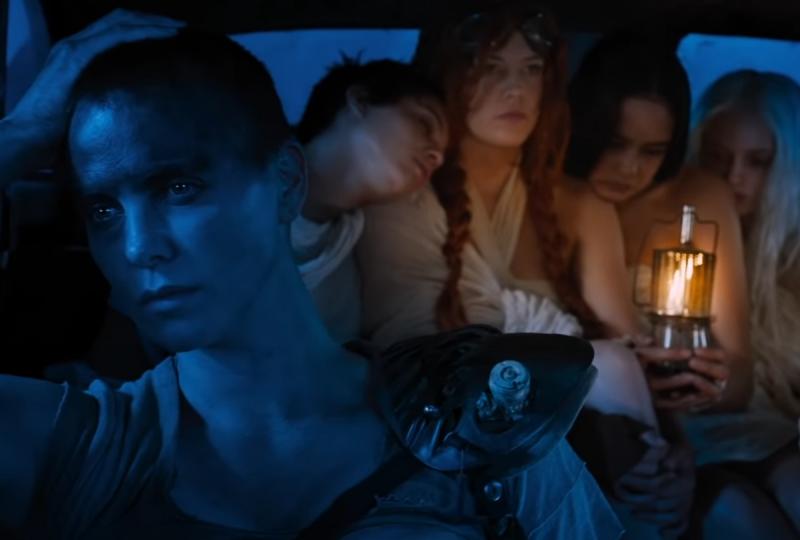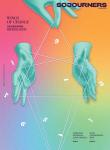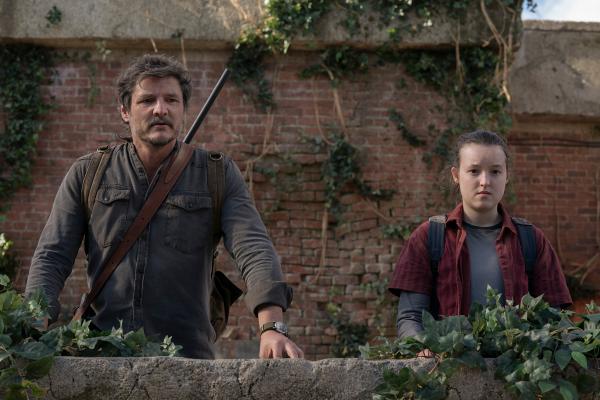HBO’S BIGGEST POST-APOCALYPTIC SHOW, The Last of Us, imagines a brutal world — and the mushroom zombies are only occasionally the source of danger. The first season followed Joel (Pedro Pascal), as he escorted teen Ellie (Bella Ramsey), who is immune to the zombie infection, to a hospital that can turn her immunity into a cure. In the final episode [SPOILERS], Joel and Ellie reach their destination. But when Joel learns they can only manufacture the cure by killing Ellie, he kills the doctor who was set to operate on Ellie. Joel’s decision raises the question: If the world can only be saved by sacrificing the innocent, is it a world we want to save? The Last of Us, itself an adaptation of a beloved video game, is far from the first show that employs apocalypse to interrogate our morality. Our end-time imaginings can show us who we are ... and who we could be.
The Greek title of the last book in the New Testament canon is Apokalypsis (“apocalypse”), the best English rendering of which is “revelation.” Revelation isn’t about the end of the world. It’s about a revelation — an unveiling. Revelation is one example from the genre of books we call apocalyptic literature. The genre, popular among Jews and Christians for hundreds of years before and after Jesus’ life, usually features a human receiving a message from some sort of divine messenger. The messenger wants to show the listener some deeper truth about the world — something that helps the audience participate more faithfully in the new world God is bringing forth.
Remember that scene in The Wizard of Oz (1939) where Dorothy and her crew are cowering before Oz the Great and Powerful, but then Toto runs over and pulls back the curtain so we can see not a wizard but a wizened old man working a bunch of levers? In a moment, no one is scared anymore. That is what apocalyptic literature hopes to accomplish: It reveals the truth about our world so that we can live well.
The book of Revelation is addressed to seven churches in the Roman province of Asia (modern-day Turkey). The churches have all responded to the dominant Roman culture in various ways, ranging from harsh resistance to synchronicity. John wants to pull back the curtain on the Roman Empire to reveal that Rome is not a benevolent, trustworthy caretaker bringing peace to the world, but rather, a devil-empowered, all-consuming beast who has already been defeated. John expects the churches, upon hearing the revelation, to reject the imperial religious systems that demand suffering, and instead, follow the self-sacrificing way of Jesus. Revelation should lead to transformation.
While the genre of Revelation is (mostly) unique in scripture, the question of how we survive the end of existence as we know it is one of the formative questions of the whole canon. But apocalypse isn’t the end of the world. Maybe it’s only the end of a world, and by attending to the revelation, we can become co-laborers in bringing about a new type of world.
The Bible begins with the end of a world. As Julianna Baggott, author of the postapocalyptic Pure trilogy, once pointed out to me, Genesis opens with the end of paradise, and the rest of the Bible is humanity trying to figure out how to live in the aftermath. Additionally, the scholars and priests who compiled the Hebrew canon did so after the Babylonian Exile. And the writers of the New Testament experienced what biblical scholar N. T. Wright calls an exile in their own land: Though they lived in the Promised Land, they were not sovereign.
madmaxfuryroad.culturelede.apocalypse.jpg

It’s no wonder Christians resonate with the apocalyptic stories we’re telling today. Presently, U.S. Christians grapple with a faith that has been weaponized for dominance — dominance of both vulnerable populations and of the Earth. Like God’s people after the Exile, faithful Christians today see a world that bears the scars of our faithlessness. Like the people of Jesus’ day, we feel like exiles in our own faith communities. And like the churches of the Revelation, we live in the shadow of empire, wondering what authentic faithfulness even looks like.
Mad Max: Fury Road (2015) has a deceptively simple plot. It’s a 120-minute chase that literally stops and turns around for the final act. But in this simplicity is a profound revelation: a condemnation of escapism. Imperator Furiosa (Charlize Theron) runs from the patriarchal cruelty of Immortan Joe (Hugh Keays-Byrne), who uses a faux Norse religious framework to manipulate and exploit his multitudes. Furiosa absconds with Joe’s wives, promising to take them to the Green Place, an Edenic matriarchy where she grew up.
But the Green Place is no more, and Furiosa’s only hope is to overthrow Joe (with a little help from Max, played by Tom Hardy). The message is clear: There’s nowhere else for us to go; we must fight for the home we have. Such a message rejects the sort of escapist evangelizing that echoes from too many pulpits — that dangerous and enticing “promise” that God will destroy the earth after taking the faithful away to heaven.
Apocalypse stories are quick to critique religion that manipulates. Revelation 13 warns readers about the “Land Beast,” a creature who looks like the Lamb/Jesus but speaks like the Dragon/Devil. A Land Beast crops up in episode 8 of The Last of Us. “When We Are in Need” introduces Pastor David (Scott Shepherd), an at-first-glance humble man who leads a small religious community. But David explodes into violence when he’s challenged, and we discover that he has been feeding dead people to his community. He embodies a patriarchal system of power that exploits the margins for the good of the center. It’s heartbreaking — but not shocking — that such systems of thought endure and even flourish when all else is stripped away.
Apocalypse stories aren’t all doom and gloom. Station Eleven, HBO’s recent adaptation of Emily St. John Mandel’s novel, invites us into a world a generation removed from a deadly pandemic. The gentle, deliberate show asks, “what endures when all the structures that give our world meaning — banks, schools, and churches — have collapsed on themselves?” For the most part, Station Eleven’s new world is lush; Eden is making a comeback. And what remains for humanity? Art. Love. People working to “till and keep the earth.”
Whether the end of the world comes at the hands (claws?) of monsters, a warming globe, or a pandemic, there’s always something that remains. We know in our bones that evil is persistent, and that sin has consequences. But we sense, too, that those consequences aren’t eternal. Only three things last forever: faith, hope and love. And you know what the greatest of those is, right?

Got something to say about what you're reading? We value your feedback!







